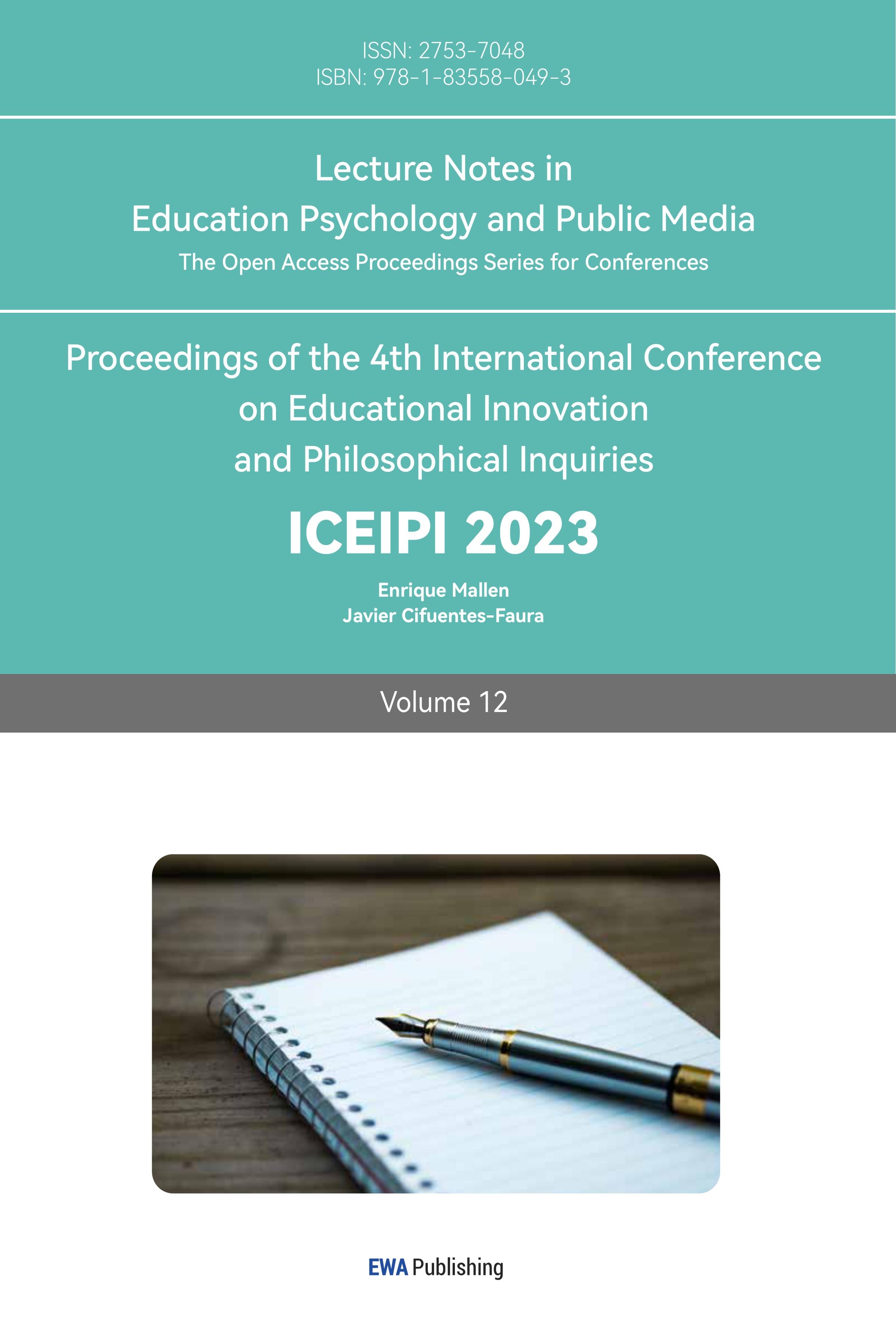References
[1]. Yaoran Li et al. Long-Term Prospects and College Students’ Academic Performance[J]. Journal of Psychoeducational Assessment, 2019, 37(3): 358-371.
[2]. Park Chankyu. Analyzing the relationships among college students’ English learning motivation, beliefs, and achievements[J]. International Journal of Tourism Management and Sciences, 2019, 34(7): 235-255.
[3]. Zhang Ying.(2017).A Research on the Relationship between the Freshmen’s English Learning Motivation and Achievements in a Chinese University. Journal of Education, Society, and Behavioural Science. doi:10.9734/BJESBS/2017/33749.
[4]. Kew Si Na and Sirirat Petsangsri and Zaidatun Tasir. (2020). The Relationship between Academic Performance and Motivation Level in e-Learning among Thailand University Students. International Journal of Information and Education Technology, 10(3) doi:10.19738/j.cnki.psy.2022.14.018.
[5]. From expectancy-value theory to situated expectancy-value theory: A developmental, social cognitive, and sociocultural perspective on motivation. J.S. Eccles and A. Wigfield Contemporary Educational Psychology, 61 (2020), Article 101859, 10.1016/j.cedpsych.2020.101859.
[6]. Schunk and DiBenedetto, 2020 Motivation and social cognitive theory. D.H. Schunk and M.K. DiBenedetto Contemporary Educational Psychology, 61 (2020), Article 101832, 10.1016/j.cedpsych.2019.101832
[7]. Fereidooni-moghadam et al. (2017). Relationship between Achievement Motivation and Academic Performance in Nursing and Midwifery Students at Ahvaz Jundishapur University of Medical Sciences in 2014- 2015. Journal of Research Center for Medical Education Development. Vol. 8(Issue 3, p335-344). Retrieved from http://journals.ajums.ac.ir/article_79874.html.
[8]. Hayes, S. A., & Watson, S. L. (2013). The impact of parenting stress: A meta-analysis of studies comparing the experience of parenting stress in parents of children with and without autism spectrum disorder. Journal of autism and developmental disorders, 43, 629-642.
[9]. Wen-Zhonglin, Z. L., & Hou, J. (2006). Mediated moderator and moderated mediator. Acta Psychologica Sinica, 38(03), 448.
[10]. Usher, E. L., Ford, C. J., Li, C. R., & Weidner, B. L. (2019). Sources of math and science self-efficacy in rural Appalachia: A convergent mixed methods study. Contemporary Educational Psychology, 57, 32-53.
Cite this article
Liu,Y.;Luo,Z.;Wang,J. (2023). The Influence of College Students’ Attitude of Choosing Educational Improvement on Academic Performance ——The Mediating Role of Achievement Motivation and Learning Initiative. Lecture Notes in Education Psychology and Public Media,12,318-326.
Data availability
The datasets used and/or analyzed during the current study will be available from the authors upon reasonable request.
Disclaimer/Publisher's Note
The statements, opinions and data contained in all publications are solely those of the individual author(s) and contributor(s) and not of EWA Publishing and/or the editor(s). EWA Publishing and/or the editor(s) disclaim responsibility for any injury to people or property resulting from any ideas, methods, instructions or products referred to in the content.
About volume
Volume title: Proceedings of the 4th International Conference on Educational Innovation and Philosophical Inquiries
© 2024 by the author(s). Licensee EWA Publishing, Oxford, UK. This article is an open access article distributed under the terms and
conditions of the Creative Commons Attribution (CC BY) license. Authors who
publish this series agree to the following terms:
1. Authors retain copyright and grant the series right of first publication with the work simultaneously licensed under a Creative Commons
Attribution License that allows others to share the work with an acknowledgment of the work's authorship and initial publication in this
series.
2. Authors are able to enter into separate, additional contractual arrangements for the non-exclusive distribution of the series's published
version of the work (e.g., post it to an institutional repository or publish it in a book), with an acknowledgment of its initial
publication in this series.
3. Authors are permitted and encouraged to post their work online (e.g., in institutional repositories or on their website) prior to and
during the submission process, as it can lead to productive exchanges, as well as earlier and greater citation of published work (See
Open access policy for details).
References
[1]. Yaoran Li et al. Long-Term Prospects and College Students’ Academic Performance[J]. Journal of Psychoeducational Assessment, 2019, 37(3): 358-371.
[2]. Park Chankyu. Analyzing the relationships among college students’ English learning motivation, beliefs, and achievements[J]. International Journal of Tourism Management and Sciences, 2019, 34(7): 235-255.
[3]. Zhang Ying.(2017).A Research on the Relationship between the Freshmen’s English Learning Motivation and Achievements in a Chinese University. Journal of Education, Society, and Behavioural Science. doi:10.9734/BJESBS/2017/33749.
[4]. Kew Si Na and Sirirat Petsangsri and Zaidatun Tasir. (2020). The Relationship between Academic Performance and Motivation Level in e-Learning among Thailand University Students. International Journal of Information and Education Technology, 10(3) doi:10.19738/j.cnki.psy.2022.14.018.
[5]. From expectancy-value theory to situated expectancy-value theory: A developmental, social cognitive, and sociocultural perspective on motivation. J.S. Eccles and A. Wigfield Contemporary Educational Psychology, 61 (2020), Article 101859, 10.1016/j.cedpsych.2020.101859.
[6]. Schunk and DiBenedetto, 2020 Motivation and social cognitive theory. D.H. Schunk and M.K. DiBenedetto Contemporary Educational Psychology, 61 (2020), Article 101832, 10.1016/j.cedpsych.2019.101832
[7]. Fereidooni-moghadam et al. (2017). Relationship between Achievement Motivation and Academic Performance in Nursing and Midwifery Students at Ahvaz Jundishapur University of Medical Sciences in 2014- 2015. Journal of Research Center for Medical Education Development. Vol. 8(Issue 3, p335-344). Retrieved from http://journals.ajums.ac.ir/article_79874.html.
[8]. Hayes, S. A., & Watson, S. L. (2013). The impact of parenting stress: A meta-analysis of studies comparing the experience of parenting stress in parents of children with and without autism spectrum disorder. Journal of autism and developmental disorders, 43, 629-642.
[9]. Wen-Zhonglin, Z. L., & Hou, J. (2006). Mediated moderator and moderated mediator. Acta Psychologica Sinica, 38(03), 448.
[10]. Usher, E. L., Ford, C. J., Li, C. R., & Weidner, B. L. (2019). Sources of math and science self-efficacy in rural Appalachia: A convergent mixed methods study. Contemporary Educational Psychology, 57, 32-53.









